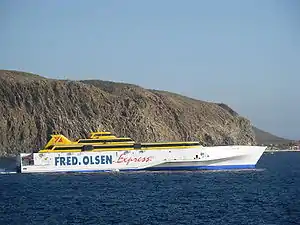 Benchijigua Express leaving Los Cristianos | |
| History | |
|---|---|
| Name | Benchijigua Express |
| Owner | Fred Olsen Express[1] |
| Operator | Fred Olsen Express |
| Port of registry | Santa Cruz de Tenerife[1] |
| Builder | Austal[1] |
| Yard number | H260[1] |
| Laid down | 11 November 2003[1] |
| Launched | 25 September 2004[1][2] |
| Christened | 5 November 2004[3] |
| Completed | 12 April 2005 |
| Identification |
|
| Status | In service |
| Notes | HSC-Passenger B |
| General characteristics | |
| Tonnage | 3,504 GT[1] |
| Length | 126.0 m (413.4 ft)[1] |
| Beam | 30.4 m (99.7 ft)[1] |
| Draught | 4.06 m (13.3 ft)[1] |
| Installed power | |
| Propulsion | 3 Jet Type Propellers[1] |
| Speed | 36 kn (67 km/h; 41 mph) |
| Capacity |
|
| Crew | 22 |
Benchijigua Express is a fast ferry, operated by Fred. Olsen Express between the Canary Islands, Tenerife, La Gomera and La Palma in the Atlantic Ocean. She was delivered in April 2005. At 127 metres (417 ft) long, the ferry is the second-longest trimaran in the world, less than a metre shy of the Independence class littoral combat ship, which was based on Benchijigua Express's design. Her body is made of aluminium with a special offshore coating, and is the second-largest vessel with an aluminium hull. The ship's name, derived from the village of Benchijigua on La Gomera where Fredrik Olsen had property, was previously used twice since 1999.
Design and construction
The Benchijigua Express was built by Austal in Henderson, Western Australia.[4] The vessel is 126.65 metres (415.5 ft) long, 30.4 metres (100 ft) wide, and has a draught of 4 metres (13 ft). She can reach speeds of 42 knots (78 km/h; 48 mph), although her normal service speed is 36 knots (67 km/h; 41 mph).
The vessel is powered by four diesel engines of MTU Series 8000 (20V 8000 M71L[1]), each with 9,100 kW[1] at 1,150 rpm[1] driven electric generators, housed in two engine rooms. Each of the two diesels in the rear engine-room drive one Kamewa 125 SII[5] steerable waterjet propulsion from Rolls-Royce. The overall performance of both machines at the front engine room is transferred to a Kamewa 180 BII booster waterjet.[5] The electrical energy is generated by four MTU 12V 2000 M40 generator units.[6]
Up to 1,291[7] passengers are distributed on two decks. Due to the short crossing time, there are no passenger cabins. For vehicle transport there are 123 car spaces and 450 metres (1,480 ft) of truck lane; the latter can be converted into an additional 218 car spaces.[7] The vehicle deck can be loaded and unloaded in 30 minutes.
Predecessor
The ship's name is now used for the third time since 1999. The first Benchijigua Express (IMO number: 9206712) was entered into service in 1999 and renamed Bentayga Express later in 1999. The second Benchijigua Express (IMO No: 9213337) started its service between Los Cristianos and San Sebastián in January 2000. In November 2004 she was renamed Bentago Express to free the name for this vessel.
Related designs
Austal and General Dynamics based the hull design of the Independence class littoral combat ship on the Benchijigua Express design.[8]
References
- 1 2 3 4 5 6 7 8 9 10 11 12 13 14 15 "Benchijigua Express (G110920)". DNV Vessel Register. DNV. Retrieved 23 October 2016.
- ↑ "Austal Launches World's Largest Aluminium Ship". Austal. 26 September 2004. Archived from the original on 28 December 2013. Retrieved 29 December 2010.
- ↑ "Fred. Olsen, S.A. and Austal Celebrate a Christening". Austal. 8 November 2004. Archived from the original on 28 December 2013. Retrieved 27 December 2013.
- ↑ Austal Ferry Contract Heralds a New Era in Fast Sea Transportation Austal 20 June 2003
- 1 2 "Benchijigua Express: Specifications (Datenblatt)". Fred Olsen Express. Retrieved 27 December 2013.
- ↑ "Trimaran to Dominate High Speed Sea Transport". Austal. 13 April 2005. Archived from the original on 30 December 2013. Retrieved 29 December 2010.
- 1 2 "Benchijigua Express — Trimaran Vehicle/Passenger". Ship Technology. Retrieved 29 December 2010.
- ↑ "Independence Class LCS". taktikz.com. Retrieved 23 January 2015.
External links
![]() Media related to IMO 9299056 at Wikimedia Commons
Media related to IMO 9299056 at Wikimedia Commons